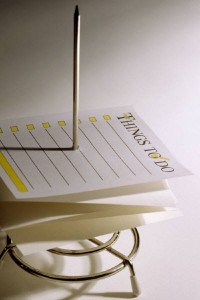For many of you, your season has either already ended or is winding down significantly. As you prepare to leave school and stop competing for a while, you should be mindful of the ways in which an investment of your summer time in debate can make a huge difference in how successful you are next year.
You may have noticed that, by the end of the season, you were debating much better than you were at the beginning. This is for a variety of reasons: you’re at the peak of your topic knowledge; you have more experience, etc. One of those reasons, however, is simply that you’ve been debating regularly for an entire season. You research and speak often, and have structured practice and team work times. Those factors, repeated over a period of days, make you better. Consistency helps you move forward because you spend your time building on gains instead of re-learning things you’ve forgotten.
Many debaters lose skills over the summer because they view those months as “time off” debate and stop practicing and researching until the school year re-starts. As a result, they spend the first few months of the next season behind on research and re-learning some of the same lessons they learned last year. Today, we want to make sure that doesn’t happen by giving you 6 things to put on your to-do list right now, before you even leave for summer vacation.
1. Schedule an “exit meeting” with your coach. Now that you have a clear picture of your entire season, do a de-brief. Schedule a time when you and your coach both have at least an hour to talk and take stock of the season. Discuss:
a. What went well. This is an easy but important part. It’s necessary to recognize what worked, whether that was moving practices to Wednesday nights or requiring finished files to have underlining and highlighting. Just confirming out loud that certain things worked well is a great way to ensure you keep doing them and provides positive reinforcement that well thought out policies get good results.
b. What didn’t go so well. This is harder and requires the willingness to be honest and self-critical. Now that the season is over, however, it’s important to identify mistakes so you don’t repeat them. This is also the best time to get into constructive criticism; you have the entire summer to fix any issues and a whole year ahead of you so it’s less intimidating.
c. What your goals are for next season and this summer. Clearly identify what you’d like to accomplish personally, as a team, competitively, and non-competitively. It’s important that you both know what you want out of the season so you can plan to do things that support that mission. If your coach, for example, doesn’t know you want to try to qualify for the TOC, he or she may not build a schedule with bid tournaments in mind. If you want to win states, however, you may want to focus on regional travel. Either way, your coach can’t read you mind, so he or she will need to know what you’re hoping to accomplish.
d. Any obstacles that stand in your way. Whether your partner is graduating or your budget is too small to support your travel goals, you need to talk about it. That way, you can plan ways to deal with these issues and talk about the best way to do that. Giving yourself the entire summer to hatch a plan and work through it is a great way to maximize that time and guarantees you won’t show up next season with a host of issues and no idea where to start. It’s also a good time to adjust your expectations, if you need to, before you face disappointment. For example, if your coach feels you can only fundraise for one end-of-year reward tournament, you’ll know you have to concentrate your energy on just that one.
Keep an open mind. Your coach has experience and perspective that you lack just by virtue of being too close to your own debate career. He or she will be able to manage your expectations and give a realistic take on what you’ll need to do to get there.
2. Do the same with your partner, if you have one. Do this meeting second, and include your coach if you like. Now that you have your individual goals set, you need to figure out how your current partner fits into them. Discuss your honest expectations, what you’re willing to do to achieve your goals, and what you’ll need from them. This meeting is a great way to take stock of what kind of match you are and decide if you should continue working together. It’s also a great way to clear the air of any issues you had during the season but may not have been able to address.
To be clear, you should come to this meeting with the goal of moving forward. Don’t use it as a forum to bicker over past mistakes but instead as a way to talk about commitment. For example, if your goal is to win the state tournament, and your coach thinks that, in order to do that, you’ll need to spend 2-3 more hours per week on debate than you did before, you need to talk to your partner about whether or not that’s a reasonable expectation.
If you’re on the same page, great! If not, you should start figuring out what you’d like to do for a partner in the next year. Talk to other teammates who you think may have similar goals and see if they’d be interested in debating together. No other options? Consider talking to your coach about helping to recruit motivated freshmen or approach your old partner with some compromises.
3. Figure out what, if any, summer debate programming you’d like to attend. Recently, summer debate programming has become a popular way for students to keep their skills sharp during break. There are a number of summer debate programs available for all levels, prices, and commitments. You should decide now, however, if you’d like to attend one.
If you decide not to: For some students, formal summer institutes don’t really make sense. If you have a summer job where you work a lot of hours or have other obligations, such as internships or family responsibilities, it may not be feasible to explore summer options.
If this is you:
- Take advantage of other ways to learn about debate and the topic. Aside from Debate Central resources, many camps post some of their lectures for the public. They also post their evidence sets. Now is a good time to follow or like major camps on social media to keep up on anything they may make available free of charge.
- Consider part-time, single-day, or commuter options. Debate Central, as well as several Urban Debate Leagues, hosts several free, single-day workshops. Other camps, such as UMKC SDI, offer commuter options so you can attend during the day but return home at night. Check out your local college programs, UDL’s, and Debate Central to see if there’s something near you.
- Just keep working. Remember, the vast majority of college debaters don’t attend any kind of institute before their season. They prepare for a topic by reading everything they can get their hands on and making it a point to work consistently. If you do these things, you’ll get many of the benefits of a camp.
If you decide to attend a camp: For other students, debate camp is a good way to focus research and get some coaching from experienced instructors.
If this is you: Start looking into a summer program now. Check out the college debate programs in your area, as well as nationally. Many established programs also have associated camps. To find one that fits your needs:
- Decide how far you’re willing to travel. This single decision will influence which camps you look into. If you’re willing to travel, check out national options. If you’re not, think locally.
- Start checking out scholarships. Many camps have scholarships for students with a financial need or who meet other specified criteria. Once you’ve narrowed your camp options, send inquiries to institute directors to see if you qualify for any assistance. The earlier you do this, the more likely you are to be successful. There are also semi-independent awards, like the Vince J. Binder Urban Debate Scholarship, that are available to select groups (in this instance urban debaters) to attend any local or national camp.
- Talk to your parents about your options, and apply. Make sure you heed all relevant deadlines.
- Remember, camp is no replacement for hard work. You should still expect to work on debate during the summer outside of the camp context. The debaters who get the most out of camp are the ones who use it as a frame for work they would have been doing anyway.
4. Have a to-do list, and include accountability measures. Make sure you make a to-do list for the summer. Actually write it down. Include everything you want to accomplish and deadlines for those projects. You can develop this list on an ongoing basis – during your coach meeting, during your partner meeting, at camp, etc. The important part is to include accountability measures – things that will keep you from procrastinating. The way you accomplish this will be largely unique to you. If you’re a social type, maybe you want to check in with your coach or partner every week about your progress. Not wanting to let them down may be all the motivation you need not to skip assignments. If you’re a more solitary person, maybe you ration something (video games, favorite TV shows) and only allow yourself to participate in it once you’ve finished your debate work.
Whatever you do, include some kind of incentive to make yourself do it. That way, you won’t fall victim to the unstructured nature of summer days and are more likely to get things accomplished.
The point is, you should expect to procrastinate because it’s summer and take active measures to counterbalance your procrastination.
The other point is, having a written to-do list is more likely to get you working on concrete things than having a vague mental list that you’re constantly revising.
5. Give yourself a reading list and a reading wish list. The nice thing about summer is that you have the time to really dive into book research. Since book research is time-consuming, it can be difficult to dive into during the season. In the summer, however, that’s much less of a consideration. You can really delve into primary sources on some philosophical arguments (for example, actually read Foucault instead of reading people writing about Foucault). You can also read topic books, which can give in-depth insight.
Book research is particularly awesome because, while article research is easy to duplicate, book research is not. You’re more likely to stumble upon something unique and interesting that others haven’t. That gives you a competitive edge.
In addition, summer research’s relaxed pace is great for really gaining topic knowledge because you have the time to really read something for content, not just to distill the debate-relevant arguments from the text.
At the beginning of the summer, check your local library’s topic-relevant sections and consider what else you’d like to learn about for debate. With that, create a reading list. Depending on your reading pace, you can plan on reading about a book every week. Doing just this will really enhance your background knowledge and get you thinking about the topic in complex and surprising ways.
6. Finish school on a high note. Finally, we’d be remiss if we didn’t encourage you to finish your school year strong. There’s so much pressure at the end of the debate season that it’s easy to get overwhelmed and feel like you need a break before the school year has quite come to an end. This can really hurt your grades and your GPA, not to mention relationships with teachers who you may have in the future.
Even if you have an ‘A’ in a class, you shouldn’t assume that the final won’t make a huge difference. We’ve heard too many stories about debaters thinking it was mathematically impossible to get below an ‘A’ based on their current scores only to find a ‘C’ staring back at them on their report card. Underperforming on your final is unlikely to win you respect from your teachers, and many of them may deduct points from hidden areas like “class participation” as a way to show that every test is important. Remember: if they wanted you to be able to opt out of the final because you had high marks, they would have simply let anyone with ‘x’ number of points not take it.
In addition, your final exams are more than just tests. They’re ways to practice skills that may build on one another. Skipping a final in, say, calculus, means that you could start the next school year already behind in your work. If that happens, it’s unlikely that your summer break will have done you any favors; in fact, you’re likely to forget even more. You can quickly fall behind at the very time when the debate season is picking up.
That’s the most important part. We’ve written a lot on this blog about never setting debate aside and working every day, even in the summer, as though you have a championship tournament that very weekend. The one time we give you full permission to check fully out of debate and fully into school, not worrying about balance, is finals time. Finish strong and you’ll start the next season academically ahead and ready to go. Good luck this summer!








you should include something about whether partners should go to the same debate camp or not.